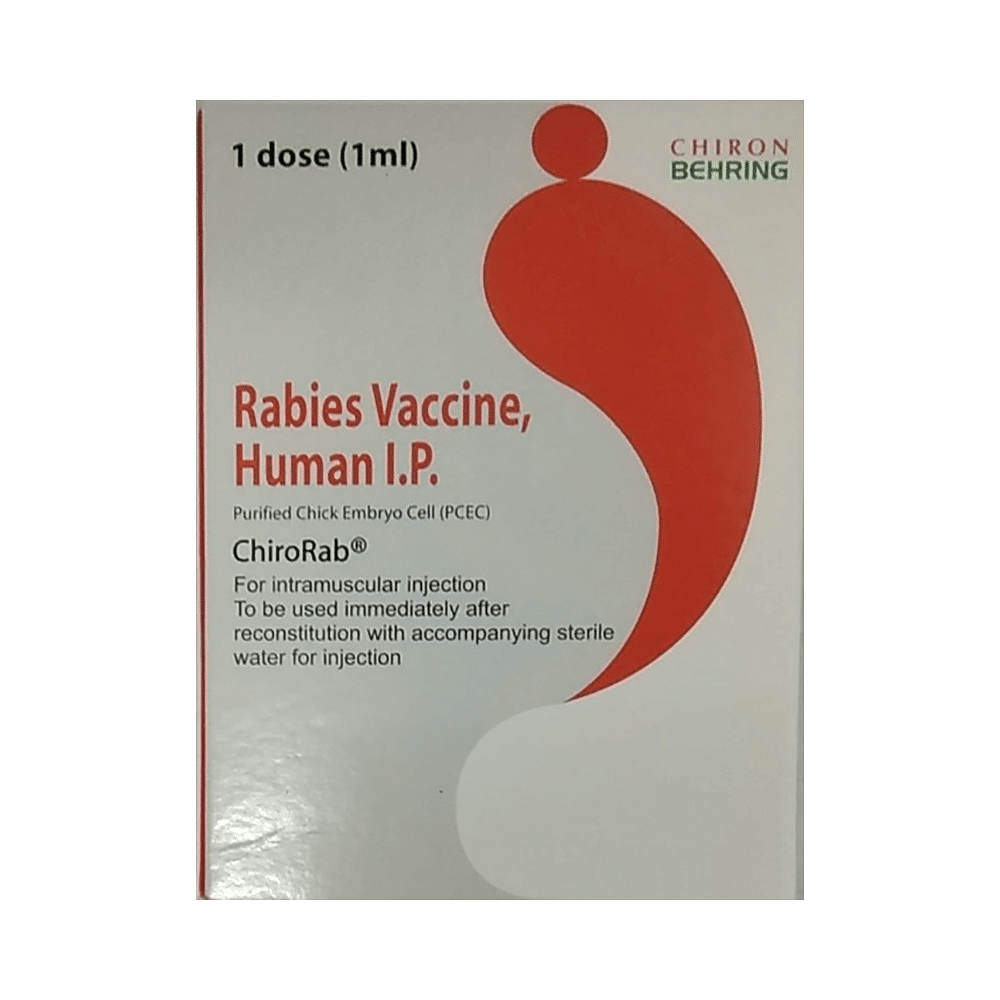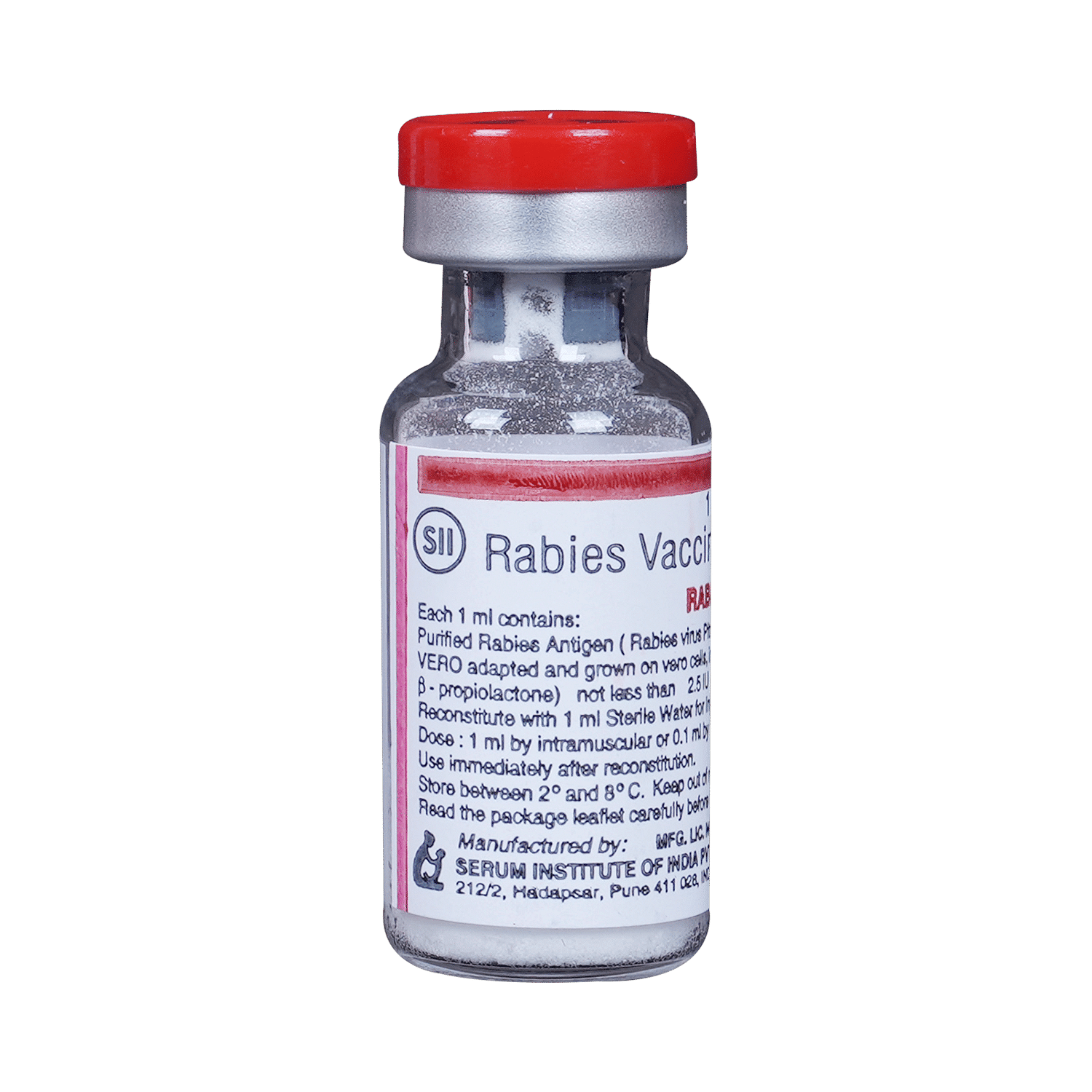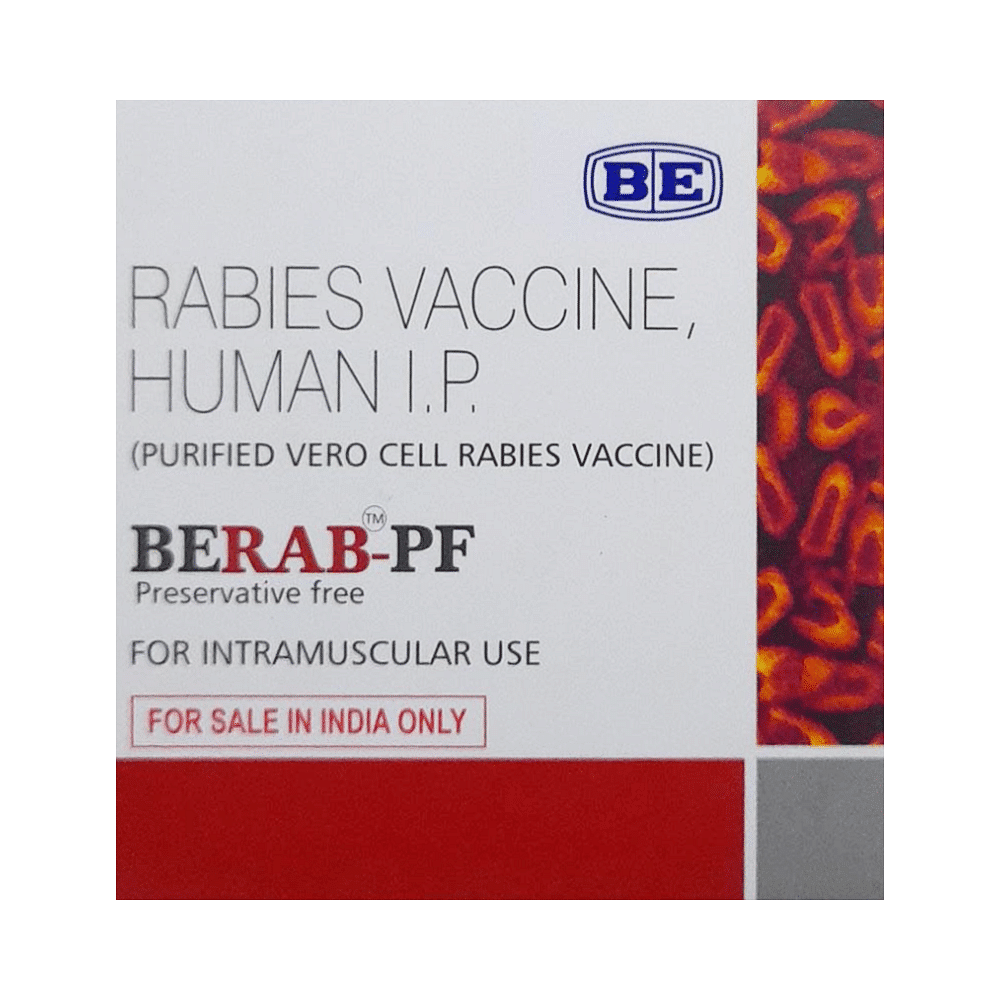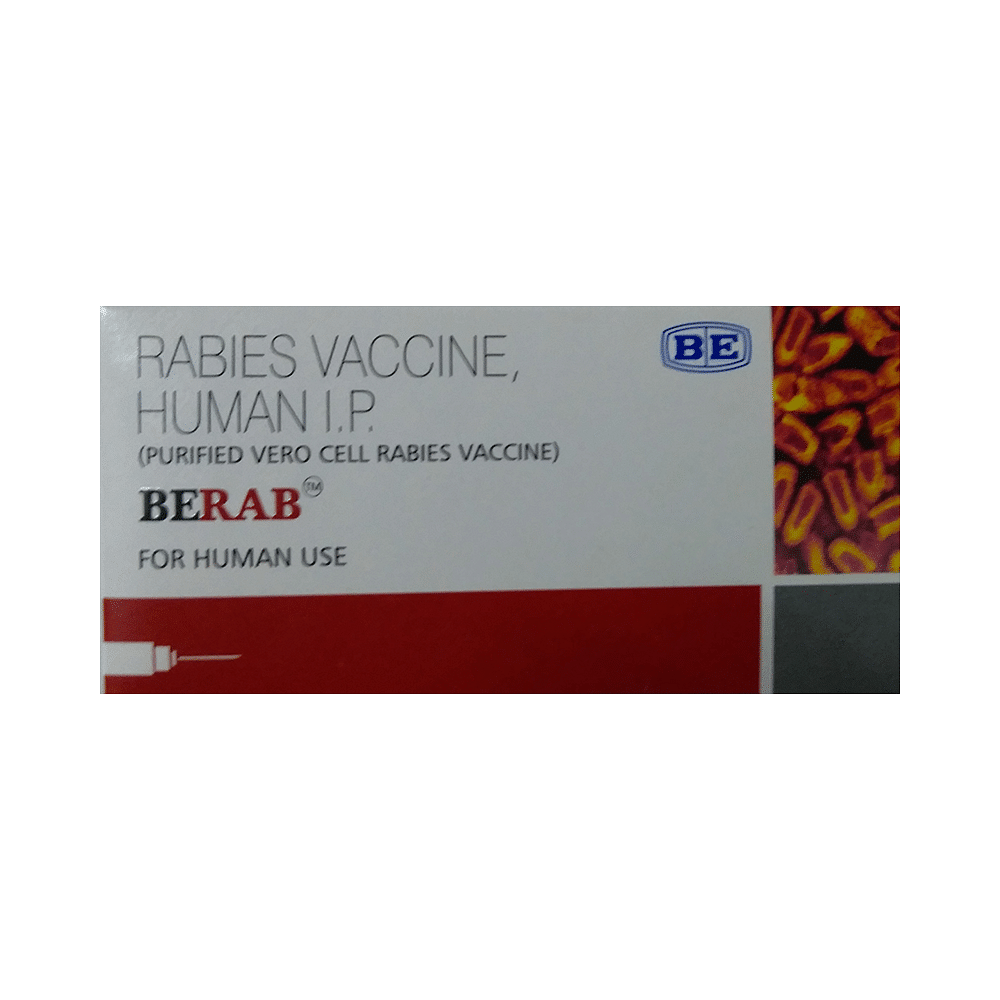
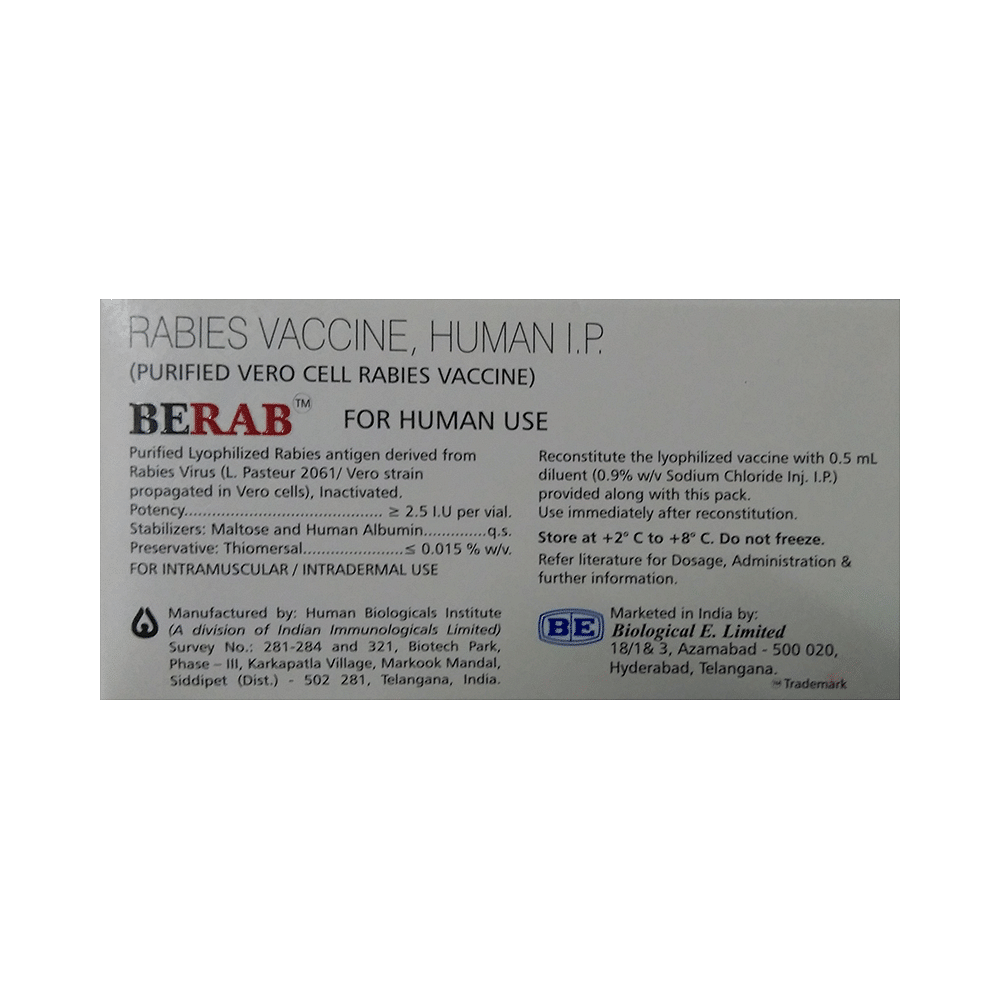
Berab Vaccine
Manufacturer
Biological E Ltd
Salt Composition
Rabies vaccine, Human (2.5IU)
Key Information
Short Description
Berab Vaccine is given to people who are at higher risk of coming in contact with rabies, such as veterinarians, and to people after an animal bite if the animal could have rabies.
Dosage Form
Injection
Introduction
Berab Vaccine is given by injection by a doctor or nurse. It is administered post thorough washing of all bite wounds as early as possible. The sooner treatment is begun after exposure, the better. Post-exposure anti-rabies vaccination should always include administration of both Immunoglobulin and vaccine, with the exception of persons who have previously received complete vaccination regimens. It is very important to complete the course of the vaccine to prevent this fatal disease.
Directions for Use
Your doctor or nurse will give you this medicine. Kindly do not self-administer.
Safety Information
Side Effects
Pain Joint pain Vaccination site redness Swelling
Alcohol Warning
It is not known whether it is safe to consume alcohol with Berab Vaccine. Please consult your doctor.
Breastfeeding Warning
Berab Vaccine is probably safe to use during breastfeeding. Limited human data suggests that the drug does not represent any significant risk to the baby.
Pregnancy Warning
Berab Vaccine is generally considered safe to use during pregnancy. Animal studies have shown low or no adverse effects to the developing baby; however, there are limited human studies.
Interacting Medicines
Mycophenolate mofetil Azathioprine Cyclophosphamide Mercaptopurine
How it works
Berab Vaccine is an inactivated vaccine. It helps develop immunity by forming antibodies, which are proteins that protect against infection caused by viruses.
Quick Tips
Berab Vaccine helps prevent rabies. It is given as an injection into the muscle of the upper arm. If you are at risk of being bitten, the vaccine is given as a course of three injections on 0, 3, and 7 days. A booster dose is needed one year after completing the course.
Related Medicines
Frequently asked questions
How does rabies spread?
The rabies virus is transmitted through contact with the saliva of infected animals. Infection typically occurs after exposure to a bite from an animal that has rabies. However, any direct contact with the saliva of an infected animal (alive or deceased) can increase the risk of infection if the person has broken skin or if saliva enters their eyes, nose, or mouth.
Is rabies preventable?
Yes, rabies is 100% preventable. Proper wound management and immediate administration of rabies immunoglobulin (RIG) combined with the Berab Vaccine are proven to be highly effective in preventing rabies even after exposure to high-risk situations.
What are the symptoms of rabies?
Rabies attacks the nervous system (brain and spinal cord). Initial symptoms can resemble a flu with fever, headache, and general discomfort. Within days, the disease progresses to more serious symptoms like anxiety, confusion, agitation, abnormal behavior, delirium, and hallucinations.
Who should receive this vaccine?
The Berab Vaccine is recommended for individuals in high-risk occupations such as veterinarians and their staff, animal handlers, rabies researchers, and certain laboratory workers. International travelers may need the vaccine if they will be exposed to animals in areas where dog rabies is prevalent. It's crucial to prioritize vaccination even with potential exposure risk.
Can a pregnant woman receive Berab Vaccine after exposure to rabies?
Yes, the Berab Vaccine can be administered to pregnant women. Reports of fetal abnormalities linked to Berab Vaccine use in pregnant individuals are non-existent. In high-risk situations, medical professionals may recommend pre-exposure vaccination for pregnant women even if there is an increased risk of exposure.
What are the side effects of Berab Vaccine?
Most side effects are mild and temporary at the injection site. Moderate side effects, like hives, joint pain, or fever, may occur in a small percentage (6%) of individuals receiving booster doses.
Who should not receive Berab Vaccine?
The Berab Vaccine is not typically used for routine vaccination in the general population. It's not recommended for people experiencing moderate or severe illness. If you have any doubts, consult your healthcare provider.



